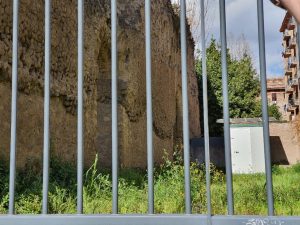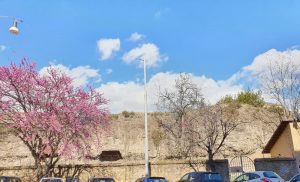On Saturday 28th October we set off on our odyssey to Athens. After a good night’s sleep from a full day of travelling, we dove straight into the agenda for Day One, which consisted of walking around the Kerameikos site, as well as the Agora, along with their respective museums. After a very short excursion at the Epigraphic Museum, we finished off our first day wandering around the National Archaeological Museum, home to some unique artefacts.
 To kick off Day Two we made our way over to the main attraction, the Akropolis, a jewel of Athenian architecture. Once we made it to the top, the view of Athens was absolutely incredible, so obviously many photos were taken. An aspect of Greek theatre came into perspective as we stopped off at the Theatre of Dionysus on the way down, one of the numerous sites on the slopes of the Akropolis. Then after some lunch and shopping, we were shown around the Akropolis Museum, before heading back to the BSA to be treated to a lecture of “Redressing Aphrodite on Lord Hamilton’s Meidias hydra” by our very own, Prof. Amy Smith.
To kick off Day Two we made our way over to the main attraction, the Akropolis, a jewel of Athenian architecture. Once we made it to the top, the view of Athens was absolutely incredible, so obviously many photos were taken. An aspect of Greek theatre came into perspective as we stopped off at the Theatre of Dionysus on the way down, one of the numerous sites on the slopes of the Akropolis. Then after some lunch and shopping, we were shown around the Akropolis Museum, before heading back to the BSA to be treated to a lecture of “Redressing Aphrodite on Lord Hamilton’s Meidias hydra” by our very own, Prof. Amy Smith.
On the morning of Day Three in the Greek capital we walked around the Panathenaic stadium and were even lucky enough to see a vast collection of all of the Olympic torches to date, which was a memorable experience. That afternoon we leapt forward in history and visited the Byzantine and Christian Museum, and it was absolutely fascinating to learn about the impact that Christianity had on the development of the ancient world. For example, the ideology of the gods was completely reshaped and many of the myths and stories lost their influence on people in the ancient world. It is now so interesting to see the various aspects of antiquity that still exist in modern religion today.

In the midst of the trip there was an optional hike up Mount Lycabettus on the morning of Day Four, to obtain, as with the Akropolis, an outstanding view of Athens. This was just an early morning walk for anyone who fancied it and was certainly a great way to start the day.
After that we explored Hadrian’s Library, the Roman Forum and the Tower of Winds in the morning and then in the afternoon, we visited the Numismatic and Cycladic Museums. Being able to view a grand variety of ancient coins was just incredible. The detail depicted on the coins was outstanding, from images that referenced famous battles, deities, animals, historical figures to myths and scenes from epic poems. Some favourites included coins bearing: the chariot of the goddess Nike being pulled by four horses and the reunion between Odysseus and his dog Argus from Homer’s Odyssey was another fan favourite.
 Moving away from all of the coins, our final site in Athens was the Cycladic Museum, where we explored various pieces of art from the ancient world, with Dr Rebecca Levitan from Kings College London, who turned our focus on the marble Cycladic figurines. These miniature figures mostly resembled women and there were very few that depicted men, with the design being very minimalistic and only showing a few select features, such as the nose, arms and breasts.
Moving away from all of the coins, our final site in Athens was the Cycladic Museum, where we explored various pieces of art from the ancient world, with Dr Rebecca Levitan from Kings College London, who turned our focus on the marble Cycladic figurines. These miniature figures mostly resembled women and there were very few that depicted men, with the design being very minimalistic and only showing a few select features, such as the nose, arms and breasts.
For our final day we exited the Athenian bubble, making our way over to Nafplio, and stopping at Mycenae to see the tomb of Agamemnon on the way. Our final museum stop was the archaeological museum, home to some fascinating artefacts such as pots, masks, armour and weapons.
Aside from all of the historical sites and museums we also had a lot of free time to explore the Greek culture along with its exciting cuisine, and although we had a busy schedule, we even managed to squeeze in a visit to the beach.
A week in Greece to be remembered. Many thanks to all involved in the organisation of this amazing trip.
Written by Henry Tandy
























